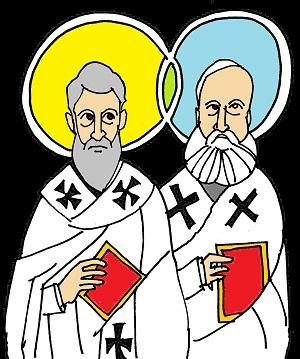
"Who are you?" (John 1:19).
Memorial of Saints Basil the Great and Gregory Nazianzen, Bishops and Doctors of the Church
After two millennia, the church continues to peer back into the first centuries of the emerging Christian faith community to find its foundation. The church then, suffering persecution from without and dissension within, was struggling to grasp and define the implications of the death and resurrection of Jesus. In hindsight we ask how so fragile an enterprise survived and took hold to become the basis for global Christianity and its estimated two billion adherents?
The question posed in today's gospel reading was first put to John the Baptist. "Who are you?" "Are you Elijah?" "Are you the Prophet?" John tells his interlocutors that he is only a messenger, sent to prepare for the coming of another, God's promised messiah. Jesus will later pose a similar question to his disciples: "Who do you say that I am?"
Today’s first reading from John reflects these debates, even perhaps in the first century. The author fiercely states the position of his community, asking,
Who is the liar?
Whoever denies that Jesus is the Christ.
Whoever denies the Father and the Son, this is the antichrist.
Anyone who denies the Son does not have the Father,
but whoever confesses the Son has the Father as well.
Let what you heard from the beginning remain in you.
If what you heard from the beginning remains in you,
then you will remain in the Son and in the Father.
Everything we believe as Christians and celebrate in this Christmas season depends upon the astonishing claim that Jesus of Nazareth is both fully human and fully divine, the Word of God made flesh, the visible face of the invisible God. If Jesus was only a divine being who appeared briefly among us in human guise, then our human nature was not transformed from within. If Jesus was only a charismatic human figure, his claim to bring salvation is only conjecture.
What we recite in our faith communities when we say the Creed was still being formally defined for over 300 years after the time of Jesus. Only by fierce debate and fragile consensus at the first official church councils did our faith ancestors find the language to balance the doctrine of Jesus' identity in order to rescue it from what are now seen as heretical views on both sides of the divine-human spectrum.
Today we honor two of the great thinkers of the Eastern church who helped forge that balance, Basil and Gregory, fourth-century bishops in Asia Minor (now Turkey). Historically speaking, without their efforts, there would be no Christian church. The survival of the doctrinal corpus of the church these past 2,000 years rests on the orthodoxy (correct teaching) these early theologians defined and defended.
We share in that balance and the durability of that truth in our membership in the body of Christ, our human brother and divine savior. It is cause for celebration and gratitude. Thanks be to God.







